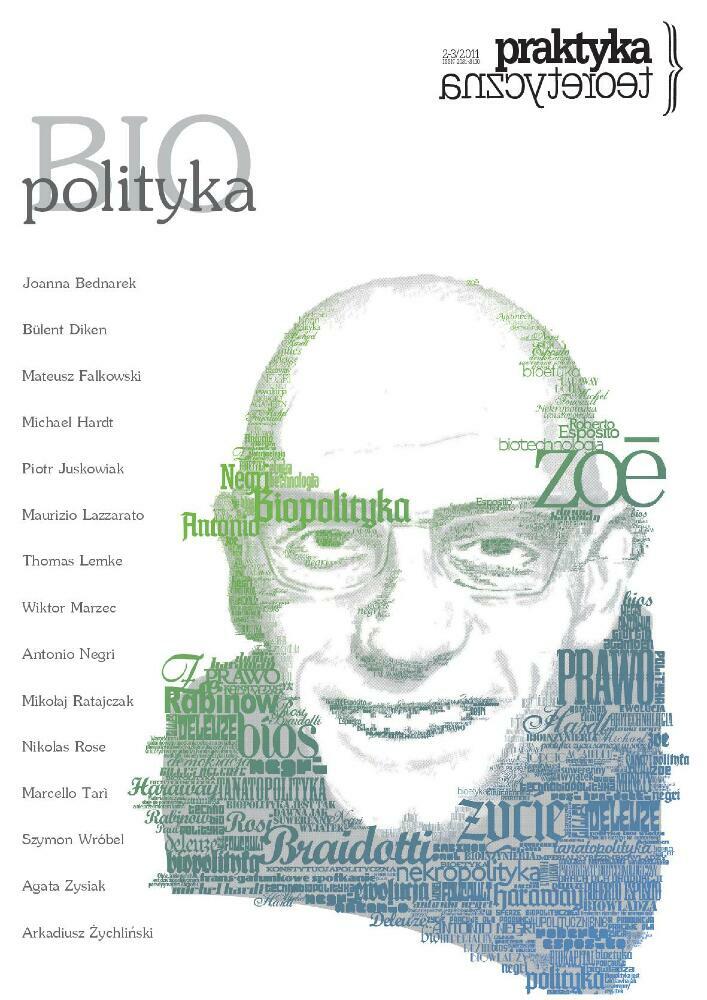Abstract
Tekst jest szczegółową analizą genealogii pojęcia biopolityki od jej wczesnego stosowania przez teoretyków rasy i państwa-organizmu, przez koncepcje ekologiczne oraz technocentryczne po myśl Michela Foucaulta oraz współczesne projekty odwołujące się do prac francuskiego filozofa. Autor nie skupia się jedynie na zarysowaniu historycznego kontekstu sięgania po termin „biopolityka”, lecz interesuje go również, w jaki sposób omawiane przez niego teorie ujmują relację między życiem i polityką, prawdą naukową a normą itd. W ostatnim rozdziale nakreślone zostają także kontury analityki biopolityki oraz
ukazane znaczenie omawianego pojęcia dla współczesnych problemów z zakresu socjologii i filozofii polityki.
References
Agamben G. 2008. Homo sacer: suwerenna władza i nagie życie. Warszawa: Prószyński i S-ka.
Agamben G. 2008. Stan wyjątkowy. Kraków: Korporacja Ha!art.
Bruns H. 1977. Vorwort des Herausgebers. In Für Wahrheit und Redlichkeit im Lebensschutz und in der Biopolitik. Wiesbaden.
Buchstein H., Beier K. 2004. Biopolitik. W Politische Teorie: 22 umkämpfte Begriffe zur Einführung. Wiesbaden.
Daele W. 2005. Soziologische Aufklärung zur Biopolitik. W Biopolitik. Wiesbaden.
Esposito R. 2004. Bios:biopolitica e filosofia. Torino.
Euchner W. 2001. “Politische Tiere – tierische Politik: Tradition und Wiederkehr der Zoologisierung des Politischen als biopolitics”. Leviathan 29 (3) : 371-410.
Fassin D. 2004. Biopolitique. W Dictionnaire de la pensée medicale. Paris.
Fehér F., Heller A. 1995. Biopolitik. Frankfurt/M.-New York.
Feit M. 1987. Die »Neue Rechte« in der Bundesrepublik: Organisation – Ideologie – Strategie. Frankfurt/M.-New York.
Flohr H., Tönnesmann W. 1983. Die Bedeutung der Life Sciences für die Politikwissenschaft: Selbstverständnis und Grundlagen von Biopolitics. W Politik und Biologie: Beiträge zur Life-Sciences-Orientierung der Sozialwissenschaften. Berlin-Hamburg.
Flohr H. 1998. Vom Wert der biologischen Verhaltensforschung für die Politische Soziologie. W Politik und Verwaltung nach der Jahrtausendwende – Plädoyer für eine rationale Politik. Opladen.
Foucault M. 2004. Geschichte der Gouvernementalität II: die Geburt der Biopolitik. Frankfurt/M.
Foucault M. 2006. Słowa i rzeczy: archeologia nauk humanistycznych. Gdańsk: Słowo/obraz terytoria.
Foucault M. 2010. Wola wiedzy. W Historia seksualności. Gdańsk: Słowo/obraz terytoria.
Gehring P. 2006. Was ist Biomacht?: vom zweifelhaften Mehrwert des Lebens. Frankfurt/M.-New York.
Gerhardt V. 2002. “Was Biopolitik ist und was gegen sie spricht”. Zeitschrift für Biopolitik 1 : 43-47.
Gunst D. 1978. Biopolitik zwischen Macht und Recht. Mainz.
Haraway D. 1995. Die Neuerbndung der Natur: Primaten. Cyborgs und Frauen. Frankfurt/M.-NewYork.
Hardt M., Negri A. 2004. Multitude: Krieg und Demokratie im Empire. Frankfurt/M.-New York.
Hardt M., Negri A. 2005. Imperium. Warszawa: W.A.B..
Heins V. 1998. M. Flitner. Biologische Ressourcen und »Life Politics«. W Konfliktfeld Natur: biologische Ressourcen und globale Politik. Opladen.
Heller A. 1996. Has Biopolitics Changed the Concept of the Political?: Some Further Toughts About Biopolitics. W Biopolitics: the Politics of the Body. Race and Nature.
Hertwig O. 1922. Der Staat als Organismus: Gedanken zur Entwicklung der Menschheit. Jena.
Hettlage R. 1990. Das Tier im Menschen – die verspätete Suche nach biologischen Ursachen. W Die Rationalität politischer Institutionen: interdisziplinäre Perspektiven. Baden-Baden.
Kjellén. R. 1924 Der Staat als Lebensform. Berlin.
Kohl L. 1933. “Biopolitik und Geopolitik als Grundlagen einer Naturwissenschaft vom Staate”. Zeitschrift für Geopolitik 10 : 305–310.
Latour B. 2011. Nigdy nie byliśmy nowocześni: studium z antropologii symetrycznej. Warszawa: Oficyna Naukowa.
Lemke T. 1997. Eine Kritik der politischen Vernunft: Foucaults Analyse der modernen Gouvernementalität. Hamburg-Berlin.
Lemke T. 2010. Biopolityka. Warszawa: Sic!.
Mahieu J. 2003. Volk – Nation – Rasse: Grundlagen der Biopolitik. Riesa.
Meadows L. 1972. Die Grenzen des Wachstums –Bericht des Club of Rome zur Lage der Menschheit. Stuttgart.
Mietzsch A. 2002. “Die Zeitschrift für Biopolitik – ein interdisziplinäres Medien-Projekt”. Zeitschrift für Biopolitik 1 : 3-4.
Nancy J.-L. 2002. Note sur le terme »biopolitique«. W La création du monde ou la mondialisation. Paris.
Rabinow P., N. Rose. 2006. “Biopower Today”. Biosocieties 2 : 195–217.
Reinfeld S., R. Schwarz. 1992. Biopolitische Konzepte der Neuen Rechten. W Bio-Macht. Duisburg.
Reiter H. 1939. Unsere Biopolitik und das Auslandsdeutschtum. W Das Reichsgesundheitsamt 1933-1939: sechs Jahre Iationalsozialistische Führung. Berlin.
Somit A., S. A. Peterson. 1987. “Introduction: Main Currents in Biopolitics”. International Political Science Review 8 (2): 107– 110.
Strube Ch. 2001. Zwei Kulturen der Rede von »Biopolitik«. W Die List der Gene: Strategeme eines neuen Menschen. Tübingen.
Thomä D. 2002. Anmerkungen zur Biopolitik: zwischen Gentechnologie und »Kampf der Kulturen«. W Genpool: Biopolitik und Körperutopien. Wien.
Uexküll J. 1920. Staatsbiologie (Anatomie – Physiologie – Pathologie des Staates). Berlin.
License
“Theoretical Practice” seeks to put into practice the idea of open access to knowledge and broadening the domain of the commons. It serves the development of science, thinking and critical reflection. The journal is published in open-access mode under the CC-BY-NC-SA 4.0 license (detail available here: http://creativecommons.org/licenses/by-nc-sa/4.0/). Articles published in the journal may be freely distributed, stored, printed and utilized for academic and teaching purposes without restrictions.
They should not be, however, used for any commercial purposes or be reconstructed into derivative creations. Access to the journal may not be limited or offered for a fee by any third party.
Prospective authors are obliged to fill in, sign and send back the publishing contract compliant with the CC licencing. [PL.pdf, PL.doc, EN.pdf,EN.doc].
According to this contract, authors grant the journal a non-exclusive right to publish their work under the creative commons license (CC-BY-NC-SA 4.0) without any financial obligation on both sides of the contract.
Before submission authors should make sure that derivative materials they use are not protected by copyright preventing their non-commercial publication. Authors are responsible for any respective copyright violations.
